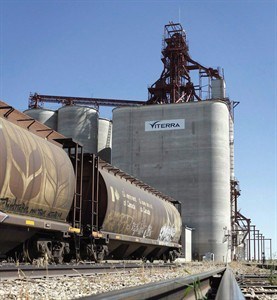
A grain elevator is shown near Regina, Sask., Aug.30, 2007. A coalition of agriculture associations says the grain industry is dealing with deteriorating rail service with an 11 per cent shortfall in the supply of railway cars. THE CANADIAN PRESS/Troy Fleece
Republished January 27, 2015 - 2:49 PM
Original Publication Date January 27, 2015 - 10:15 AM
REGINA - A coalition of agriculture associations says the grain industry is dealing with deteriorating rail service and an 11 per cent shortfall in the supply of railway cars.
The Ag Transport Coalition released a report saying that the railways have failed to supply more than 11,000 cars that were ordered in the first five months of the crop year.
The report also said the shortfall has continued to grow each week.
Wade Sobkowich, executive director of the Western Grain Elevator Association, said he's concerned that the demand for railway cars is exceeding the supply.
"It makes it problematic when we are trying to draw in products from grain farmers and execute on sale contracts," he said.
The report also found that around half of delayed customer orders for railway cars have been outstanding for at least one month.
Sobkowich said transportation delays are causing long-term problems.
"We're not getting as much shipping to the United States and Mexico ... those are corridors where demand has fallen off because car supply has fallen off."
Service is better than last year, however, which saw months of railway backlogs after a bumper grain crop, he added.
In that fallout, Canadian National Railway (TSX:CNR) and Canadian Pacific Railway (TSX:CP) were fined a combined total of $150,000 for failing to transport the minimum required grain volumes as set out by the federal government. Farm lobby groups in Saskatchewan and Manitoba said the fines didn't reflect the damage caused by the delays.
CN was billed $100,000 for violations related to shipments for the weeks of July 28 and Sept. 7. Canadian Pacific, which was assessed a $50,000 penalty for the week of Sept. 7, is disputing the fine on the basis that the shortfall was a result of matters beyond its control.
CP spokesman Jeremy Berry said Tuesday that the railway has transported 12 per cent more grain this crop year when compared to the same time period last year.
"It is important to note that Week 21, the one referenced in the report as evidence of poor service, is over Christmas. Origin and destination terminals were shut down over Christmas, some for three days, affecting our ability to load and unload rail cars," Berry said in an email. He said there are still supply chain problems.
The coalition's report said 25 per cent of orders for train cars for that week were met.
"(Canadian Pacific) has stressed and will continue to stress that Canadian grain loading is a function of the performance of all supply chain members, and that the supply chain must operate on a 24/7 basis to support balanced pipelines, reduce congestion and drive velocity," Berry said.
CN spokesman Mark Hallman said balance has been restored in Western Canada's grain supply chain.
"CN’s wait list for western grain hoppers is now under 2,000, representing just a few days of orders to fill," he said in an email.
Earlier this month, Transport Canada said it was still reviewing fall data on grain volumes to ensure that railways adhered to the volume requirements.
Last March, Transport Minister Lisa Raitt said fines against rail companies could total up to $100,000 a day for delays. But Transport Canada said in September it would fine the railways up to $100,000 weekly at the minister's discretion.
Sobkowich said the improvement in service this year is partly because shippers were able to move higher volumes of grain in August compared to the previous year.
He added warm weather has also helped — cold temperatures can affect brake systems, which forces railway companies to use shorter trains.
"They've been able to run regular-length trains for more weeks so far," he said. "However, we still have a system where rail-car supply and capacity is less than demand for those cars."
Sobkowich said overall railway transportation needs to be revamped to be based on demand. The Ag Transport Coalition is planning to publish weekly data on railway transport to keep track of delays.
"The trend line is not going in the right direction," Sobkowich said. "Hopefully it improves."
News from © The Canadian Press, 2015